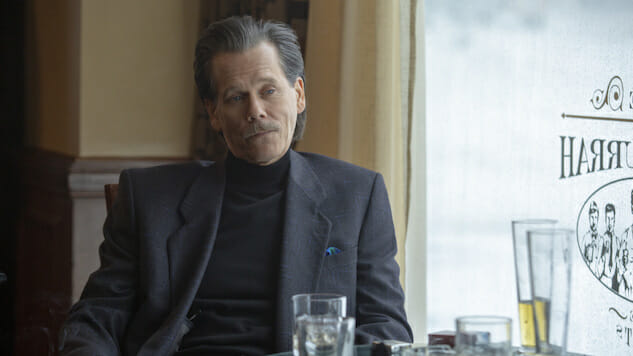The Sneaky Greatness of Showtime’s City On A Hill

Through five episodes of City on a Hill, I kept a silent vigil for some flicker of redemption in the character of FBI agent Jackie Rohr, played by Kevin Bacon with a measure of wolfish vitality and a measure of dread as he confronts his impending, inevitable oldness. Rohr represents the rapid, erratic heartbeat of the Showtime miniseries; thin and leering, he prowls the streets of early ‘90s Boston with the kind of heedless aggression born of either total confidence or total desperation. I watched as he bullied and abused colleagues, callously moved prosecutors and informants around like pawns, and behaved like an absolute prick, repeatedly, toward his innocent wife. I waited patiently, because I have been conditioned by even the best prestige dramas to expect some kind of moral compensation (or at least penitence) from the most compromised characters.
My patience was not rewarded, and I gave up at some point in the fifth episode, when Rohr hopped in the back of an ambulance to gleefully mock a dying colleague.
In this week’s TV power rankings, I noted the contrast between Rohr and The Wire’s Jimmy McNulty, another flawed officer of the law. Unlike McNulty, who maintains a stubborn inner goodness even as his nature drives him to disappoint and sometimes betray his lovers and colleagues, Rohr is repellent from the beginning, and the writers make no effort—at least halfway through this 10 episode miniseries—to give us something to like. He’s no McNulty, and he’s also no Walter White, driven inexorably to greater feats of evil by some original misfortune. He just is, and when someone asks him why he gets in so deep—what motivates him?—he alludes to a line from Macbeth:
I am in blood/Stepp’d in so far that, should I wade no more,/Returning were as tedious as go o’er.
In other words, this is his life, period, and it would take just as much effort to turn back. If his ethical philosophy runs any deeper—Rohr is about as dirty as a cop can be while still landing, somewhat vaguely, on the side of justice—we certainly don’t learn about it.
But it doesn’t take long to realize, even on a gut level, that Rohr is essential to his time and place. It’s partly Bacon’s magnetism, partly the crackling dialogue, and partly the razor-sharp attention to plot, but whatever the brew, you won’t be able to look away from the elemental ugliness of the whole spectacle. Here we have a character who is a metaphor for the show itself: sometimes inscrutable, always unapologetic, and ultimately fascinating.
City o
n A Hill is a show with room for just three stars, and the second of those is Aldis Hodge. He plays DeCourcy Ward, an imposing, stone-cut, suspender-wearing D.A. who, despite his idealism, is one of the few people in Boston who can impress Rohr. There’s a staggering moment at the end of the pilot where, in a window seat at a bar, while snowflakes fall outside, Ward delivers a monologue about his father, a man who marched with King, who suffered beatings at the hands of racists like Bull O’Connor, and who came home from those escapades and visited that refracted violence on his children. Once, Ward says, the old man “caught him with a thumb,” and with a twist of his own fingers, he removes his glass eye and sets it on the table. Rohr’s surprised smirk, his nod of acknowledgment, speaks volumes—here is a man loathe to credit anyone outside himself, but Ward got his attention.
-

-

-

-

-

-

-

-

-

-

-

-

-

-

-

-

-

-

-

-

-

-

-

-

-

-

-

-

-

-

-

-

-

-

-

-

-

-

-

-








































